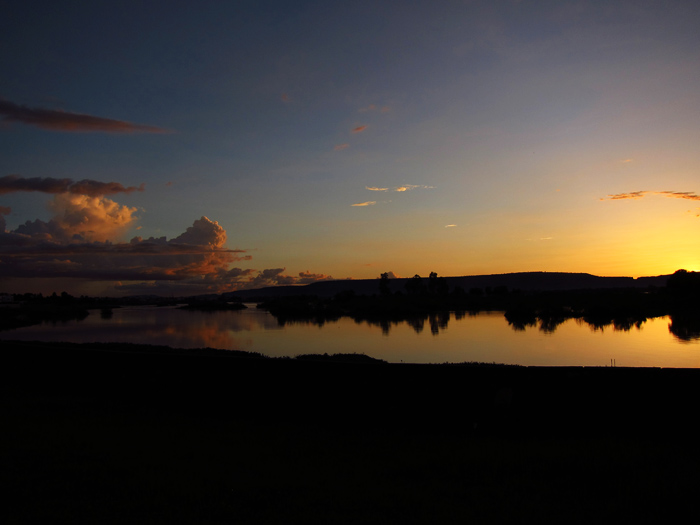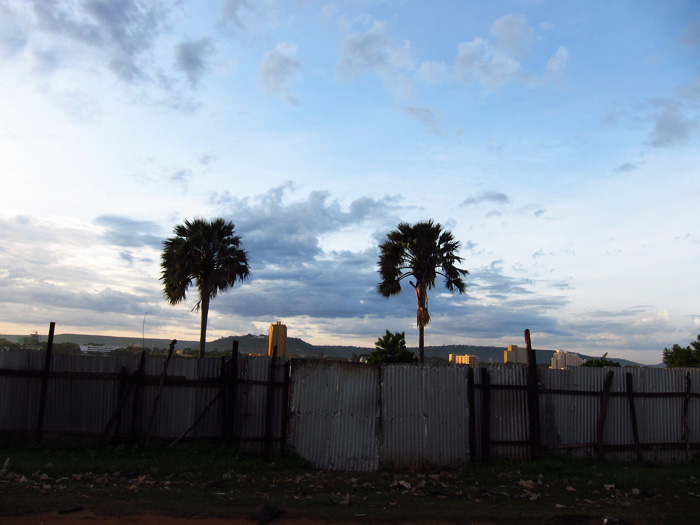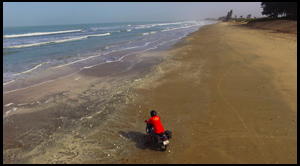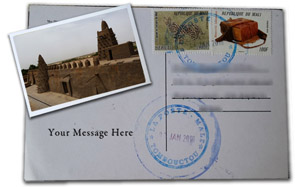Sunset at Bamako Plage
With attention rightfully focused on northern Mali, a story is unfolding in Bamako that should not be ignored.
Before I get into it, let me first say that I was never in support of the coup. Furthermore, this post is not some kind of retroactive endorsement. Mali is dealing with crises on multiple fronts. These are not going to go away anytime soon, and in some cases they may actually get worse. Want the details? Bruce Whitehouse offers a good overview of Mali’s post-coup troubles here (side note: I also highly recommend Bruce’s latest post on martial arts in Bamako.)
What’s more, some of the positive developments I am about to mention may be short-lived. Political maneuvering continues in Bamako and it remains unclear who exactly has the reins. Cheick Modibo Diarra (CMD) is the current Prime Minister and he holds the greatest responsibility in the current transitional government. Many say he is running his own show, but some say he is beholden to Sanogo and others insist that Moussa Traore (former dictator of Mali and CMD’s father-in-law) is actually calling the shots.
I’m not going to try and sort out the power dynamics of Bamako’s fractured political scene. Sanogo may have maintained his ability to pull the strings, but things are much more complicated now than they were when the CNDRE was the the only game in town. What I do know, from talking to a variety of people who work directly and indirectly with the public sector, is that CMD and the newly appointed ministers inherited a nightmare, and despite that fact, they have been able to make significant improvements in governance over the past several months.
Post-coup improvements in governance? Yes. You probably haven’t heard about any of them. Most stories involving Mali’s transitional government discuss the ongoing meddling of Sanogo and co., the attack on Dioncounda and his subsequent absence and/or the government’s lack of action with regard to the occupied north. In other instances, stories about the transitional government are filtered through the distrustful eyes of ECOWAS.
This is a story from Bamako that you probably have not heard.
By every account I have heard, the new ministers — all of whom were appointed after the coup — have been working hard to install a work ethic and a level of transparency that simply was not there pre-coup. I’m talking about basic things like showing up on time, accounting for all expenses, and actually, you know, doing work.
A friend of mine had a boss in a ministry who spent the morning playing a computer game before taking an extended lunch. No longer. There is a new culture of accountability. Time is better managed. Budget items and reimbursement requests are now being carefully scrutinized. Compare that to previous years when a minister could request and receive an 11 million CFA (about $55,000) budget for tea (no joke, that was was the annual budget for tea for the transportation minister).
One of my friends is a teacher at a high school. Seniors recently took the BAC examination, which is needed to advance to higher learning. Normally, he said, they wouldn’t even look at the exams until a month after they had been taken. This year, the education minister actually came to their school (something my friend had not seen in 5 years of teaching) and demanded that the results be posted no later than August 1st (a bit over 2 weeks after the exams have been taken). When I saw my friend, he had been grading exams all day with his fellow teachers. On a Sunday — another first for him.
Update: This is the most disputed of the conclusions I have drawn and it seems that for many people food prices have not decreased at all, but have actually gone up. The following paragraph is based on conversations I’ve had with around 20 people in the neighborhoods of badalabougou, faso kanu, baco djicorini and hamdallaye, but if the comments and emails I have been receiving these opinions are not representative at all. Also, as Ashak rightfully points out, it was stupid to say something like “ask anyone in Bamako” as clearly there is a lot of disagreement here. You can still read what I originally wrote, but also see the comments, some of which I have recopied directly below.
Update 2: It seems a lot depends on neighborhoods and particular markets. After posting the update above, I received several more emails about people saying prices actually had come down in their areas, most of them being on the south side of the river. In any case, government action on this has not been as effective as I originally made it out to be and there are a lot of mixed reports.
Original text: Ask anyone in Bamako about current food prices and you may surprised to learn that the prices have actually gone down since the coup. This is because a price fixing scheme — that may or may not have been sanctioned by the previous government — at the highest level of merchants and traders, has been broken. I can’t tell you how many people have told me of their relief that they will be able to adequately celebrate Eid and the end of Ramadan because food prices have come down. Note: see comments below for input from neighborhood of Sikoro, where residents are saying food prices are actually rising. Also, a reader referred me to this article from maliweb that suggests some merchants and traders are defying government attempts to intervene on price.
Important feedback from Ashak in the comments:
…i was a bit disappointed to read your accounts. For instance, how do you come to the conclusion that “merchants and traders are defying government attempts to intervene on price…”? Lets be honest sir, it was a pretty weak argument (actually, there was no argument).
i know you’re not a journalist, but still.. what is all this based on? Another example – ‘Ask ANYONE in Bamako about current food prices..’. Well, I have. a lot of people talk about food prices. and no one has told me that they’re going down. i strongly feel that if you’re gonna make statements – and subtly complain about journalism through your title – then you should take on the same due diligence that many of us feel Mali deserves in the media.
You can read my response to Ashak in the comments section.
Since last Thursday, I started surveying taxi drivers about police behavior post-coup. I asked a total of 14 different drivers, 13 of which told me that there has been significantly less extortion attempts from police since the coup. The lone dissent came from a driver who was upset at the fare we agreed on and it is with difficulty that I consider his opinion part of the survey (he was basically saying whatever he could to try and get a higher fare and police harassment fit with that plan). I’ve talked to 4 SOTRAMA driver+prentike pairs and they also reported less aggression from police.
Today, I had lunch with a friend who works in a ministry. He is currently working on an initiative to connect government agencies with each other via the Internet. This initiative came about after the coup. In previous years, he advocated for increased connectivity and technology use, only to have his proposals ignored.
These developments have occurred while Mali is dealing with a loss of territory, a security and humanitarian crisis, an obstinate political class, a crippled economy, threats from ECOWAS and a serious lack of support from the international community.
Perhaps the positive developments listed above will be short-lived. Installing a permanent culture of transparency and accountability is no easy task. And who knows what will come of Mali’s politics, of ECOWAS, and forces beyond. Finally, we should not forget that there are ongoing human rights abuses in Bamako. Journalists have been threatened and attacked in recent weeks. Many await news of husbands and fathers who have been detained (and possibly worse) for participating in the counter-coup attempt — wives of beret rouge soldiers have already protested once and it seems they are planning a more significant demonstration if their demands are not met.
With such human rights abuses and with ongoing meddling on the part of the military, the international and regional communities are right to avoid an endorsement of Mali’s current government. That said, the improvements in governance mentioned in this post should be acknowledged, and those outside the country should realize that this is a very important story for Malians themselves.
I am not a political person. I just want to see Mali in a better place than it is now. If you have any reports that contradict what I have written above, please share them in the comments below or feel free to email me at phil dot paoletta at gmail dot com and I will add them into the post.
From the comments, Devon reports:
I totally agree with you that the government has made good headway with keeping education, and health programs, on track. I have had a different response from my neighbors however with regards to both food prices and transportation. Everyone here in Sikoro is complaining that food prices are continuing to rise and friends have also been telling me that there are now traffic checkpoints manned by traffic police, gendarmes, and soldiers when they drive around town.
The food prices part of this is interesting. I haven’t heard anyone talk about prices rising after the coup. Please share if you have heard similar reports.
Bruce adds in the comments that harassment may be worse for private drivers:
I’m also pleasantly surprised by the results of your taxi/SOTRAMA driver survey, because I had heard from some private drivers that police harassment was getting worse. One American told me about the night in May when he was pulled over for no apparent reason by a cop on a moto threatening to have him detained in Kati. I never drove my own car in Bamako and I rarely went out after dark, but people who did (expats and Malians) complained frequently even last year that police were constantly extorting money from them at night, and they felt this problem only got worse after the coup. Maybe the bad cops are focusing more on private vehicles and less on taxis and buses?
This could very well be true. I haven’t talked to any private vehicle owners about this.
Personal: Back in Bamako now. Will be traveling to Abidjan soon for restaurant/catering biz time before heading back up this way. Get in touch if you want to meet up. Less political posts on the way.






This is good to hear–every new government vows to make such changes and I’m happy to read your report that this govt. at least appears to be serious about it. I suspect it won’t be easy even for dedicated reformers to change the dysfunctional fonctionnaire culture, where you show up late to work, then spend most of your “work day” playing computer games or drinking tea. (I confess that, upon learning that computers had been looted back in March from the offices of some civil servants I knew, my first thought was “How will they play solitaire now?”)
I’m also pleasantly surprised by the results of your taxi/SOTRAMA driver survey, because I had heard from some private drivers that police harassment was getting worse. One American told me about the night in May when he was pulled over for no apparent reason by a cop on a moto threatening to have him detained in Kati. I never drove my own car in Bamako and I rarely went out after dark, but people who did (expats and Malians) complained frequently even last year that police were constantly extorting money from them at night, and they felt this problem only got worse after the coup. Maybe the bad cops are focusing more on private vehicles and less on taxis and buses?
Hey Bruce,
Yeah, I did not take into consideration private vehicles. It could be another story for them. I really have no idea. You’re right, it’s going to be hard to establish real change. This government has been around since, what, late April? These are encouraging signs, but it’s unclear just yet whether the changes will be lasting.
It is good to see that there are significant improvements but the protection of Malian citizens is a much more urgent matter and police or army forces haven’t been sent in the North yet…and that is very disturbing.
Can you imagine a foreign militia coming into Georgia and destroying historical monuments?
Isn’t this the worst violation a country can endure? Why aren’t authorities reacting to such humiliating acts? I don’t even care if it is Sanogo or CMD or Moussa Traore or whoever is calling the shots in Mali right now…the excuse for the coup was a better protection of the North, so whatever happened to that?
I am just really disgusted with Malian government and Malians themselves for not uprising against this infamy. Where are our own private militias to protect our own? smh
Soundiata Keita is turning in his grave…the brave people of the Mande would not stand for this.
Hadji,
I agree with you about the lack of urgency on the north. And you’re right that it is in the north where there is the greatest crisis. But I also don’t think militias or a rushed military campaign are a good idea. I don’t think there is an ideal situation for the north, unfortunately, but I would be very worried about inter-communal and inter-ethnic violence if militias were to lead the way.
Phil,
A rushed military campaign? At this point, a military campaign is extremely late to say the least…these events have been going on for a long time now…shrines have been destroyed, citizens are being whipped like children and a population in Timbuktu growing angry and abandoned by their own government.
Only a militia solution can end this situation, what else? Timbuktu cannot remain in this condition, knowing the people from that area (my mother and grand-mother) and the way they’re brought up…I am very surprised the rebels haven’t been wiped out yet.
But the longer the rebels are staying there and transgressing, the bloodier it will get when the locals will take care of the matter themselves. Think about it: getting whipped in public? having your oldest sanctuaries destroyed right in front of your eyes? These rebels are not even from Timbuktu and this is what makes this matter worse!
Anyways, we can only sit back and watch…in shock and anger, I just cannot stand for idiotic and cruel behavior without anyone reacting accordingly to this type of transgression. To make matters worse, these people claim to be doing God’s work when they are humiliating people, destroying historical sites and transgressing order in various ways. They are not Islamists nor Muslims they have no idea what they’re doing.
Thanks
I didn’t think of it as a political post, Phil. More as bringing us up-to-date because we know the regular media have their own agendas and are sometimes fed misinformation, so it’s good to hear from you first-hand. Thanks.
yes, agreed, Linda!
thank you so much. this is an important message between all the rumours and negative messages and I totally agree with your observations. I’m so proud of a lot of Malian people who in the most difficult circumstances go for peace. hope to meet you soon in Mopti.
Yvonne, I hope to get to Mopti at some point soon as well. I will be going to Abidjan for a couple of weeks and then coming back some time in August, if that works and you will still be there?
Hi Phil,
Very interested to read your post. I work for Mali Health here in Bamako, and have been back for close to three weeks (thanks for your support of our matching campaign!). I totally agree with you that the government has made good headway with keeping education, and health programs, on track. I have had a different response from my neighbors however with regards to both food prices and transportation. Everyone here in Sikoro is complaining that food prices are continuing to rise and friends have also been telling me that there are now traffic checkpoints manned by traffic police, gendarmes, and soldiers when they drive around town. I wonder if, especially re: food prices, there is a difference is prices when buying in bulk or in small quantities, as is done by most people in Sikoro? Very interested to hear your different perspective though! Devon
Hey Devon,
Thanks for sharing this. As far as the checkpoints, I would agree that there are no fewer checkpoints – if anything, there are more of them – but I’m hearing that there have been far fewer extortion attempts. Are your friends dealing with the same amount (or more) of harassment at these checkpoints?
Interesting about the food prices. I will definitely add this into the post. Have you just noticed this in Sikoro? Are people referring to food prices across the board or specific things?
Phil,
Its true I haven’t really been asking about harassment a traffic checkpoints, it is definitely possible that there are more checkpoints and less harassment….
As for food prices, people are talking about continued increases in the price of meat, and staples like rice and millet. Last week, my neighbors were telling me that they can no longer buy rice, as it is too expensive, and that corn is currently the cheapest staple. I just talked to a co-worker though, and he was aware the government (in response to food crisis +Ramadan) had lifted import taxes on a certain quality of rice which should be sold at 340CFA/kilo (the highest quality rice is apparently over 450CFA/kilo for the moment). He also said that it seemed like this had yet to trickle down to Sikoro, and that many merchants have yet to use their stock of rice purchased when prices were still high, so the high prices are still being passed on to customers. This does support your point about positive action taken by the new government, and hopefully we’ll see the effect in Sikoro soon.
Phil, this is great. Thank you so much for bringing these things to light!
Phil,
i came across this article with alot of enthusiasm, as i share your view regarding the overwhelming negative images/stories and think it’s irresponsible of journalists to continue to portray Mali/Africa in such a negative and inaccurate context. however, i was a bit disappointed to read your accounts. For instance, how do you come to the conclusion that “merchants and traders are defying government attempts to intervene on price…”? Lets be honest sir, it was a pretty weak argument (actually, there was no argument).
i know you’re not a journalist, but still.. what is all this based on? Another example – ‘Ask ANYONE in Bamako about current food prices..’. Well, I have. a lot of people talk about food prices. and no one has told me that they’re going down. i strongly feel that if you’re gonna make statements – and subtly complain about journalism through your title – then you should take on the same due diligence that many of us feel Mali deserves in the media.
outside of that, i honestly hope you keep writing. i enjoy your positive attitude. peace.
Hey Ashak,
Thanks for your input. I will add your comment to that section on food. All of this is based on conversations I’ve had with a variety of people in badalabougou, faso kanu, baco djicorini and hamdallaye. But after all of the comments and emails I have received, I am learning that these conversations are not representative at all, so thanks for responding and helping provide a clearer picture of what’s going on. I agree with you that saying “ask anyone in Bamako” was poor form and stupid really as that would never be the case in normal circumstances, let alone here where it is apparent that there is a lot of disagreement.
I have no agenda with this and while there may be an aspect of media criticism, the main reason I wrote the post is that I was actually surprised to hear these things when I returned to Bamako. To be honest, I was expecting many components of the government to be completely dysfunctional. While it seems the food section of this post is not at all credible any more, and several people have brought up that private vehicle owners may still be facing a lot of police harassment (can anyone confirm this?), the other parts of this post relating to work ethic, transparency and corruption have not been contradicted. Perhaps they will once more people read the post. In any case, I was genuinely surprised to hear many of these things. To be honest, I was expecting it to be a complete mess.